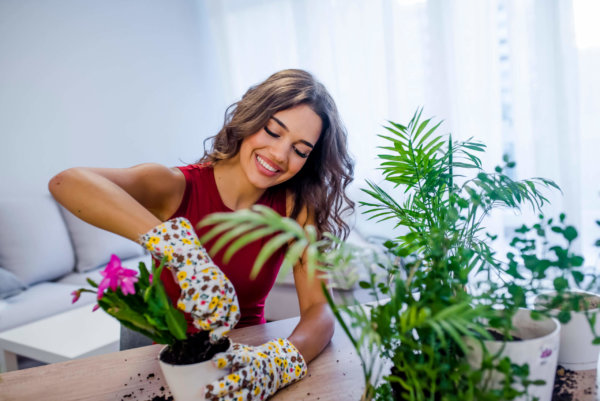What Benefits Do Houseplants Provide for Indoor Air Quality?
Filling your Sacramento home with lots of luscious, green plants is rumored to have a significant impact on indoor air quality. For years, homeowners have been encouraged to load up on living plants as way to boost oxygen levels, filter out chemical contaminants, and get rid of other airborne impurities. Now, however, experts are questioning the benefits that houseplants are purported to supply. So, how do houseplants benefit indoor air quality (IAQ)?
Fact or Myth?
Adding more plants to your living environment certainly seems like a cost-effective and eco-friendly way to up your home’s IAQ. Caring for most houseplants doesn’t take a lot of effort and doesn’t require much energy. The notion that indoor plants improved IAQs originated from a well-known NASA experiment conducted in 1989. The goal of the experiment was to determine how well plants removed airborne contaminants from closed containment facilities. More specifically, this project aimed to determine the efficacy of plants for IAQ improvements in an incredibly small-sized chamber that remained completely sealed throughout the project. The results were impressive. Living plants effectively removed harmful gases known as volatile organic compounds (VOCs) at significant rates.
However, before you head out to your local home and hardware store to load up on potted greenery, it’s important to note that you’d need nearly 700 plants in the typical home to get the same results that NASA researchers were able to achieve. In theory, plants for IAQ improvements work well, but in reality, most people live in spaces far larger than the sealed container that NASA researchers used. Moreover, most homes don’t generally remain sealed. People open and close windows and doors all of the time, and central or multi-split air conditioners are always bringing outside air in. With this in mind, the common understanding is that a fairly large number of lush houseplants can provide modest indoor air improvements if any at all.
Houseplants Can Introduce Airborne Pollutants of Their Own
There are two main benefits that houseplants are widely believed to provide when it comes to improving IAQ. These include the ability to remove harmful VOCs and other airborne particulates and the ability to produce considerable amounts of oxygen. After all, plants “breathe out” or essentially release what humans breathe in. Although there’s a bit of truth in both of these things, neither of these purported benefits accounts for the whole truth.
Most houseplants actually introduce more airborne contaminants than they remove. This is especially true of houseplants that are purchased at home and hardware stores, already potted, already fertilized, and sitting in soil that’s already rich with plant food. Many of the products that are used to keep houseplants bright, fresh-looking, and ultimately alive until you purchase them off-gas harmful chemicals all of the time.
It’s also important to note that certain plant species are constantly off-gassing VOCs. Add a bunch of plants to a relatively airtight living environment and you may actually lower your indoor air quality. To achieve a greater number of benefits than potential drawbacks, you’d have to strategically select the plant species that you intend to use, and you’d have to take great care to use only natural, organic fertilizers and other plant care products that aren’t bringing more chemical contaminants into your home. Most important of all, you have to buy a lot of plants. Remember, the average home will need at least 700 houseplants to duplicate the results of the 1989 NASA study.
Several Important Benefits That Indoor Plants Do Provide
Healthy houseplants do provide a generous number of mental health benefits. Plants have a reputation for being uplifting, motivating, and mood balancing. They’re aesthetically pleasing, and they breathe life into all types of indoor decor. If you choose your plants carefully and if you pay attention to the products that you’re using in terms of soil, fertilizer, and food, they won’t release more toxins into your home than they clear out.
Moreover, cultivating a diverse collection of indoor plants won’t just give you more eye candy. It’s currently becoming increasingly easier to bring a number of edible or fruit-producing plants inside of the home and with impressive results. Many people are growing everything from radishes to pineapples indoors. You can create a lush herb garden, purchase a small-sized blueberry bush, or even grow a pot of tomatoes right in your own kitchen. Caring for plants like these is surprisingly exciting. It’s also recognized as an effective form of stress reduction.
Effective Strategies for Improving Your Home’s IAQ
Ultimately, filling your house with a sufficient number of plants for creating and maintaining an optimal IAQ isn’t as cost-effective or easy as people are often led to believe. With the right number of plants for achieving this goal, this isn’t a sustainable strategy either. To create the reliably high IAQ that you want, you’d wind up leaving yourself with little room for anything else. There are, however, several effective strategies that you can use in lieu of creating a veritable indoor forest.
IAQ control starts with good HVAC maintenance. This includes regularly changing your HVAC air filter. For most households, this component should be cleaned or changed according to the manufacturer’s instructions at least once every 30 days. If you have pets or if you live near unlandscaped grounds, active construction, or a busy freeway, you might want to perform filter changes a bit more frequently. For an IAQ boost, think about investing in HVAC air filters with slightly higher maximum efficiency reporting value (MERV) ratings. The higher-rated a filter is, the more micro-sized particulates it will be able to filter out.
Understanding the Difference Between Air Purification and Air Filtration
It’s also important to understand the difference between air filtration and air purification. Air filtration is something that plants are definitely not capable of, even when they’re present in massive numbers. Even relatively basic air filters with modest MERV ratings can top the filtration abilities of plants. Filters catch and collect things like dirt, dust, dander, pollen, and even pet hairs. Some filters are rated to pick up a few fairly large-sized airborne contaminants, but must chemical contaminants pass right through.
Conversely, air purification actually cleans the indoor air. Air purifiers can extract harmful VOCs and other gases that are being released from unsealed particleboard, paints, and spray bottles of surface cleaners among other things. Best of all, air purifiers get rid of airborne contaminants like VOCs without releasing any VOCs of their own.
When indoor air quality is an ongoing concern, installing a whole-house air purifier is a worthwhile decision. This is equipment that will work seamlessly with your HVAC system to create a healthy, comfortable living space and one that everyone can breathe freely in.
Humidity Regulation and IAQ
Finally, humidity regulation is a critically important part of IAQ control, especially for homes that are perpetually moist. Modern HVAC systems help regulate indoor humidity. House plants do not. In fact, when present in large enough numbers, plants can actually add humidity to homes. Increased humidity can lead to mold spore and mildew development and numerous respiratory problems for the home’s inhabitants. For homes with condensation on the windows and on other indoor surfaces, installing a whole-house dehumidifier may be an important part of the IAQ control plan.
At Crystal Blue Plumbing Heating & Air, we’ve been providing reliable HVAC services to residents of the greater Sacramento, CA area since 1976. We also provide air filtration services, dehumidifiers, and indoor air quality services. If you’re looking for ways to boost the IAQ of your home, we’ve got you covered. Get in touch with us today to set up an appointment.







